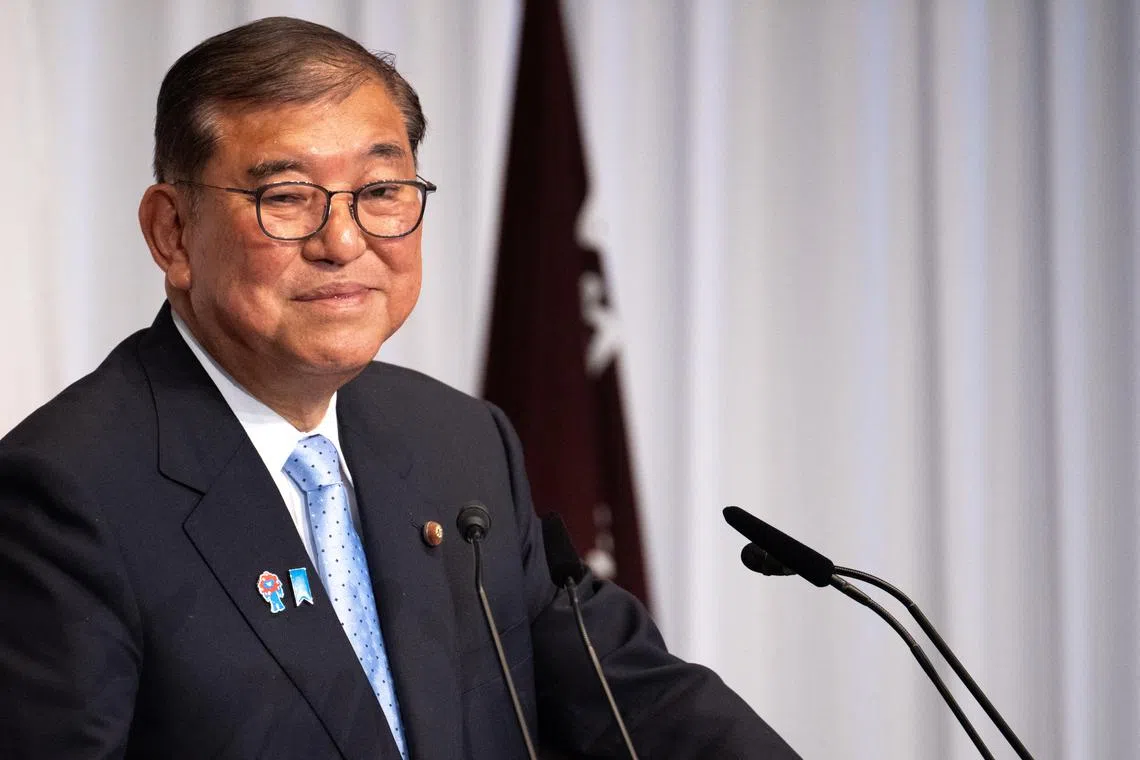Shigeru Ishiba: The ‘smile again’ Japanese PM voters frowned on
Sign up now: Get insights on Asia's fast-moving developments

Japan's Prime Minister Shigeru Ishiba's awkward manner had helped him stand out as a backbencher, but earned him scorn as premier.
PHOTO: REUTERS
Follow topic:
TOKYO - Mr Shigeru Ishiba took over Japan’s ruling party, promising to revive it from scandal.
Less than a year later, he is stepping down as prime minister
An unlikely premier who vowed to make Japan “smile again”, Mr Ishiba won the Liberal Democratic Party leadership election on his fifth attempt in late September 2024.
That put him at the helm of a party that has dominated Japan’s postwar politics, but was at one of its lowest ebbs since its founding in 1955.
His brief tenure as prime minister and party president was marked by months of fraught tariff negotiations with US President Donald Trump’s administration, details of which were finalised just days before
At home, the self-described lone wolf saw support for his administration steadily erode as his government struggled to contain consumer price rises that fuelled growing discontent over squeezed earnings and sluggish economic growth.
Third straight loss
In the Upper House election in July, voters handed Mr Ishiba, 68, a resounding rebuke.
Many backed opposition groups promising tax cuts and tighter controls on immigration blamed for depressing wages, including the far right Sanseito party
The LDP and its coalition partner Komeito lost their majority
It was Mr Ishiba’s third straight electoral defeat, following setbacks in Tokyo’s local elections in June 2024 and a Lower House loss in October 2024 when his party was mired in a political donations scandal that forced his predecessor to resign.
A former defence minister who entered Parliament in 1986 after a stint as a banker at the height of Japan’s bubble economy, Mr Ishiba was seen as a figure popular with the public who could revive the LDP’s standing when he was elevated to party leader.
But within the party, he was seen by some as a contrarian and had clashed with previous leaders.
His first act as party leader was to apologise for any unpleasantness he had caused, but LDP lawmakers were not prepared to forgive him for the electoral defeats he oversaw.
With the LDP and Komeito now reliant on opposition support to stay in power, Mr Ishiba’s departure opens the door for leadership rivals
For now, Mr Ishiba, who has also served as agriculture minister, will likely return to the back benches, where the awkward manner that earned him scorn as premier once helped him stand out in Japan's staid politics.
There he was known as a dissenting voice weighing in on contentious issues ranging from nuclear energy and the US-Japan security pact to falling birthrates and separate surnames for married couples. As party leader, he largely kept those views to himself.
Seen as an LDP intellectual heavyweight and an expert on national security policy, Mr Ishiba advocated for a more assertive Japan, less dependent on the US for its defence. He also promoted the idea of Japan joining a Nato-like alliance in Asia.
His retreat from front-line politics may give the ex-premier more time for his other passions, such as building the plastic models of ships and planes he displays in his office and steering Parliament's ramen appreciation society. REUTERS

